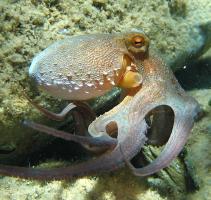 If a science fiction writer wanted to create a really bizarre alien space creature, using an octopus as a model would not be a bad place to start. After all, an octopus has three hearts, nine brains, and blue blood. The nervous system includes a central brain and large brain-like ganglion at the base of each arm which controls movement. The majority of neurons in an octopus are found in the arms, which can independently taste and touch and also control basic motions without input from the brain. An octopus also has the highest brain-to-body mass ratios of any invertebrates; greater than that of many vertebrates, as well. Not surprisingly, octopuses are highly intelligent.
If a science fiction writer wanted to create a really bizarre alien space creature, using an octopus as a model would not be a bad place to start. After all, an octopus has three hearts, nine brains, and blue blood. The nervous system includes a central brain and large brain-like ganglion at the base of each arm which controls movement. The majority of neurons in an octopus are found in the arms, which can independently taste and touch and also control basic motions without input from the brain. An octopus also has the highest brain-to-body mass ratios of any invertebrates; greater than that of many vertebrates, as well. Not surprisingly, octopuses are highly intelligent.
But it gets weirder. Unlike most other living creatures, octopuses, along with some squid and cuttlefish species, routinely edit their RNA (ribonucleic acid) sequences to adapt to their environment. That is RNA, not DNA.
Science Alert explains: This is weird because that’s really not how adaptations usually happen in multicellular animals. When an organism changes in some fundamental way, it typically starts with a genetic mutation – a change to the DNA.
Those genetic changes are then translated into action by DNA’s molecular sidekick, RNA. You can think of DNA instructions as a recipe, while RNA is the chef that orchestrates the cooking in the kitchen of each cell, producing necessary proteins that keep the whole organism going.
But RNA doesn’t just blindly execute instructions – occasionally it improvises with some of the ingredients, changing which proteins are produced in the cell in a rare process called RNA editing.
When such an edit happens, it can change how the proteins work, allowing the organism to fine-tune its genetic information without actually undergoing any genetic mutations. But most organisms don’t really bother with this method, as it’s messy and causes problems more often than solving them.
While most organisms may not bother with RNA editing, octopuses, squid, and other coleoids are not most animals. Researchers have discovered that the common squid has edited more than 60 percent of RNA in its nervous system. Those edits essentially changed its brain physiology, presumably to adapt to various temperature conditions in the ocean. They also found that at least two types of octopus and a species of cuttlefish did the same.
“Humans don’t have this. Monkeys don’t. Nothing has this except the coleoids,” says Joshua Rosenthal of the Marine Biological Laboratory and Eli Eisenberg at Tel Aviv University.
It’s impossible to say if their prolific use of RNA editing is responsible for their alien intellect, but “that would definitely be my guess,” says Noa Liscovitch-Brauer, a member of Rosenthal’s team who spearheaded the new study. “It makes for a very compelling hypothesis in my eyes.”

Fascinating.